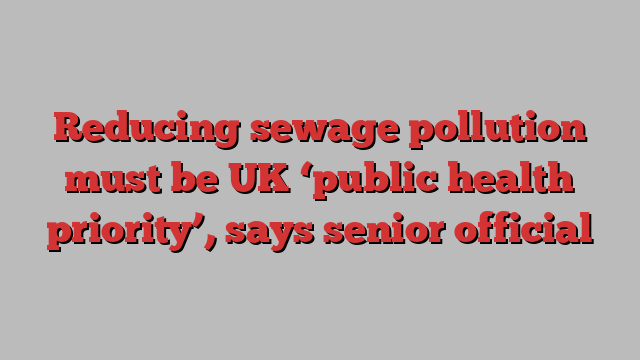
Unlock the Editor’s Digest for free
Roula Khalaf, Editor of the FT, selects her favourite stories in this weekly newsletter.
Reducing sewage pollution in UK waters must be a “public health priority”, said the chief medical officer for England.
Backing a report produced by the Royal Academy of Engineering on how sewage spillages could be reduced, Sir Chris Whitty said that “minimising human faecal organisms in fresh water is a public health priority as well as an environmental one”.
He added: “The human health aspect is one of the things that needs to be taken seriously when we’re measuring the quality of water.”
His comments come days after several thousand households in Devon were forced to boil drinking water because of a waterborne parasite, and after a report that millions of litres of raw sewage had been pumped into Windermere, England’s largest lake, on one day earlier this year.
Water companies are facing a growing backlash over sewage pollution, with thousands of campaigners holding demonstrations at beaches last weekend to mark the official start of the swimming season.
The report by the RAE called on the Department for Environment, Food and Rural Affairs to improve the monitoring of rivers, lakes and coastal waters and to get better at warning the public of the health risks when these were polluted.
Water companies also needed to reduce the volume of sewage released through overflows by building storage tanks, separate sewers and sustainable drainage systems, the report said. They also had to improve waste water treatment by using technology such as disinfection by ultraviolet light and by introducing proactive maintenance of pipe networks.
The academy suggested introducing incentives for the public to remove impervious hardstanding surfaces from homes in urban areas, such as patios or paved-over gardens. This would help more water be absorbed into the ground that would otherwise run into sewage pipes and add to the chances of overflows.
Sir Chris warned that even treated sewage could still contain human bacteria and viruses with the potential to cause serious disease if swallowed.
Sewage spills during periods of heavy rain were only “half the problem, not the full problem”, because some human faecal organisms also remained in treated water when it was released back into the environment. “The lower the water [levels], the less they’re diluted out,” he added.
“So if you’ve got a very low river because it’s been dry recently, that’s the ideal situation for children to paddle and people to swim.
“But that is the time . . . when a lot higher proportion of the faecal organisms will have come out of a sewage treatment works rather than out of storm overflows.”
The researchers admitted there was a lack of evidence to demonstrate a direct, causal link between specific wastewater discharges and particular health incidents. However, they emphasised the known health risks from exposure to high concentrations of faecal organisms.
“The principal reason for the existence of the sewerage system is to protect public health,” Whitty said.

